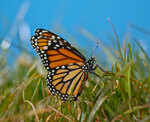rethink sustainability
Five reasons why you should consider going plant-based

The food we eat is corroding the world we live in. The beef industry is responsible for 6% of global greenhouse gas emissions1. Overfishing has meant all cod catches from the Celtic Sea should be stopped in order to avoid depletion2.
In short, right now, the food industry is Wasteful, Idle, Lopsided and Dirty (WILD). So what can we do? Solutions are, in fact, coming thick and fast. Aided by technology, innovative companies are reimagining what we eat so that food production can become more sustainable and align with a Circular, Lean, Inclusive and Clean (CLIC™) model.
One of the most effective choices consumers can make is eat less meat and dairy3. We outline why and how consumers can make better choices for the planet and add some variety to their plates.
Ditching dairy
Did you know that producing a glass of cow’s milk every day for a year requires 7,000 sq feet of land? And for a humble glass of oat milk? One tenth of the area. It is well established that dairy alternatives are healthier4. On top of this, a study from the University of Oxford found there are three times more emissions produced as a result of producing a glass of dairy milk5.
The alternative dairy market has blossomed in recent years. Take oat milk for example. One of the core advantages of this milk substitute is that the oats are farmed in North America, which avoids exposure to deforestation concerns, common in other regions. Swedish oat milk company Oatley further illustrated the opportunity in this market when it said it was working on a flotation which could value the company at $10bn. In the UK, meanwhile, plant milk sales increased by 16% last year to £278m6.
Not all alternative milks are made equal, however. Almond milk is more water intensive from a production point of view than soy or oat milk. Despite this, the consensus across the board is that it’s still better than regular dairy.
Reimagining meat
Not all burgers need meat. Both Burger King's Plant Based Whopper and the Impossible Burger actually resemble a regular patty. Alternative meats made from plants is a booming sector, giving diners the option of eating the familiar but in vegetable form. It is a timely development as an increasing number of people recognise that huge reductions in meat consumption are needed in order to avert dangerous levels of climate change7.
A report by AT Kearney8 suggested that most of the 'meat' people will eat in 2040 might not come from slaughtered animals. The majority could come from either plant-based alternatives or the emerging 'cell-grown' sector where cultured meat is made in bioreactors without the slaughter of an animal. Late last year, 'chicken bites' produced by the US company Eat Just9 were given approval for sale in Singapore, the first time a regulator has done so.
Advancements in lab-grown meat are partly coming from Silicon Valley where Memphis Meat recently announced it will construct its first pilot production plant where meat will be grown from animal cells. Other companies such as Mosa Meat, a Dutch food technology firm, and the Israeli company Aleph Farms are also garnering interest.
Read more about plant-based alternatives here: Jackfruit leads the cash in for vegan alternatives
The mighty insect
Eating grasshoppers and mealworms as part of a balanced diet may raise eyebrows in the West but for two billion people, it is simply part of their normal diet. Entomophagy, aka eating insects, first hit the high streets of the UK when Mexican chain Wahaca started offering them on their menu as a way to highlight their sustainability benefits.
The UN Food and Agriculture Organisation says we should make more of insects as they are described as an under-utilised resource. Packed full of nutrients, they can be grown on the by-products of the food industry and can be made in any kind of climate or environment10. Such is the range and demand of insects that some are salted and nibbled with a beet while others demand higher prices than fillet steak. Barclays suggests the market11 will grow to $6.3bn by 2030.
In London, Eat Grub has produced crickets, mealworms and grasshoppers for cooking and snacking for a few years. Meanwhile in South Africa, Gourmet Grubb make the 'Entomilk' dairy alternative from insects. Mars Petcare has made the 'Lovebug' pet food for cats based on insects, highlighting the fact that such innovations could be used as feed for other animals. And French company Ynsect has raised $225m for the completion of the world's largest insect farm in Amiens, which will be able to produce 100,000 tonnes of product per annum.
Read more on insect farming here: The CLIC™ Chronicles: Meet Ÿnsect, the French start-up raising beetles to tackle growing food demand
Plenty more fish…but not in the sea
The fishing industry has long been the seeding ground for environmental problems - overfishing, bycatch and deforestation to name a few. Wild fish have been depleted in huge amounts while the draining of swamps to make way for aquaculture has been described as being more harmful than cutting down rainforests.
But technology is stepping in to reverse these problems. The prawn industry could be transformed by the creation of synthetic versions by start-up New Wave Foods, which make their product out of algae and plants. An alternative cannot come too soon - overfishing has led to a decline in catches and for every 1kg of prawns caught, there is 20kg of by-catch.
The same technologies to develop lab-grown meat are also being applied to fish. Finless Food uses cell culture technology to create 'alternative seafood products' with tuna being their first target. San Francisco-based Wild Type meanwhile is aiming to use cellular agriculture to create salmon and ensure the product is affordable. Shiok Meats in Singapore creates shrimps, crabs and lobsters using cellular agriculture technology.
A new era for investors
Leading environmental writer George Monbiot12 believes that we are on the cusp of an economic transformation with these new developments of food being produced in labs. And the think-tank RethinkX believes that precision fermentation, the idea that you can programme micro-organisms to produce any complex organic molecule, will drive down costs so that modern food products will be less than half the price of animal-derived products by 2030.
The substitution of animal products is an exciting prospect that demands scrutiny. While the alternative products may not destroy the traditional markets, they could soon be well placed to disrupt them - resulting in knock-on effects for production industries such as soy and corn. And many potential opportunities for investors.
Key to the changing trends is that the changing food market is not about new diets - but new ways in how we produce food. Through these moves away from a WILD food system, we will progress to one that is Circular, Lean, Inclusive and Clean (CLIC™) – an opportunity that investors shouldn’t miss out on.
1 https://www.carbonbrief.org/video-how-beef-farmers-can-reduce-their-carbon-footprint
2 https://www.theguardian.com/environment/2021/jan/22/only-a-third-of-uks-key-fish-populations-are-not-overfished
3 https://www.theguardian.com/environment/2021/jan/22/only-a-third-of-uks-key-fish-populations-are-not-overfished
4 https://www.theguardian.com/environment/2021/jan/22/only-a-third-of-uks-key-fish-populations-are-not-overfished
5 https://science.sciencemag.org/content/360/6392/987
6 https://www.theguardian.com/business/2021/feb/27/can-oatly-milk-it-oatmilk-brand-gears-up-for-us-stock-market
7 https://www.theguardian.com/environment/2018/oct/10/huge-reduction-in-meat-eating-essential-to-avoid-climate-breakdown
8 https://www.theguardian.com/environment/2019/jun/12/most-meat-in-2040-will-not-come-from-slaughtered-animals-report
9 https://www.cnbc.com/2021/03/01/eat-just-good-meat-sells-lab-grown-cultured-chicken-in-world-first.html
10 https://www.theguardian.com/food/2021/may/08/if-we-want-to-save-the-planet-the-future-of-food-is-insects
11 https://www.theguardian.com/business/2019/jun/25/insects-tipped-rival-sushi-fashionable-food-of-future
12 https://www.theguardian.com/commentisfree/2020/jan/08/lab-grown-food-destroy-farming-save-plane
Wichtige Hinweise.
Die vorliegende Marketingmitteilung wurde von der Bank Lombard Odier & Co AG oder einer Geschäftseinheit der Gruppe (nachstehend “Lombard Odier”) herausgegeben. Sie ist weder für die Abgabe, Veröffentlichung oder Verwendung in Rechtsordnungen bestimmt, in denen eine solche Abgabe, Veröffentlichung oder Verwendung rechtswidrig wäre, noch richtet sie sich an Personen oder Rechtsstrukturen, an die eine entsprechende Abgabe rechtswidrig wäre.
Entdecken Sie mehr.






teilen.